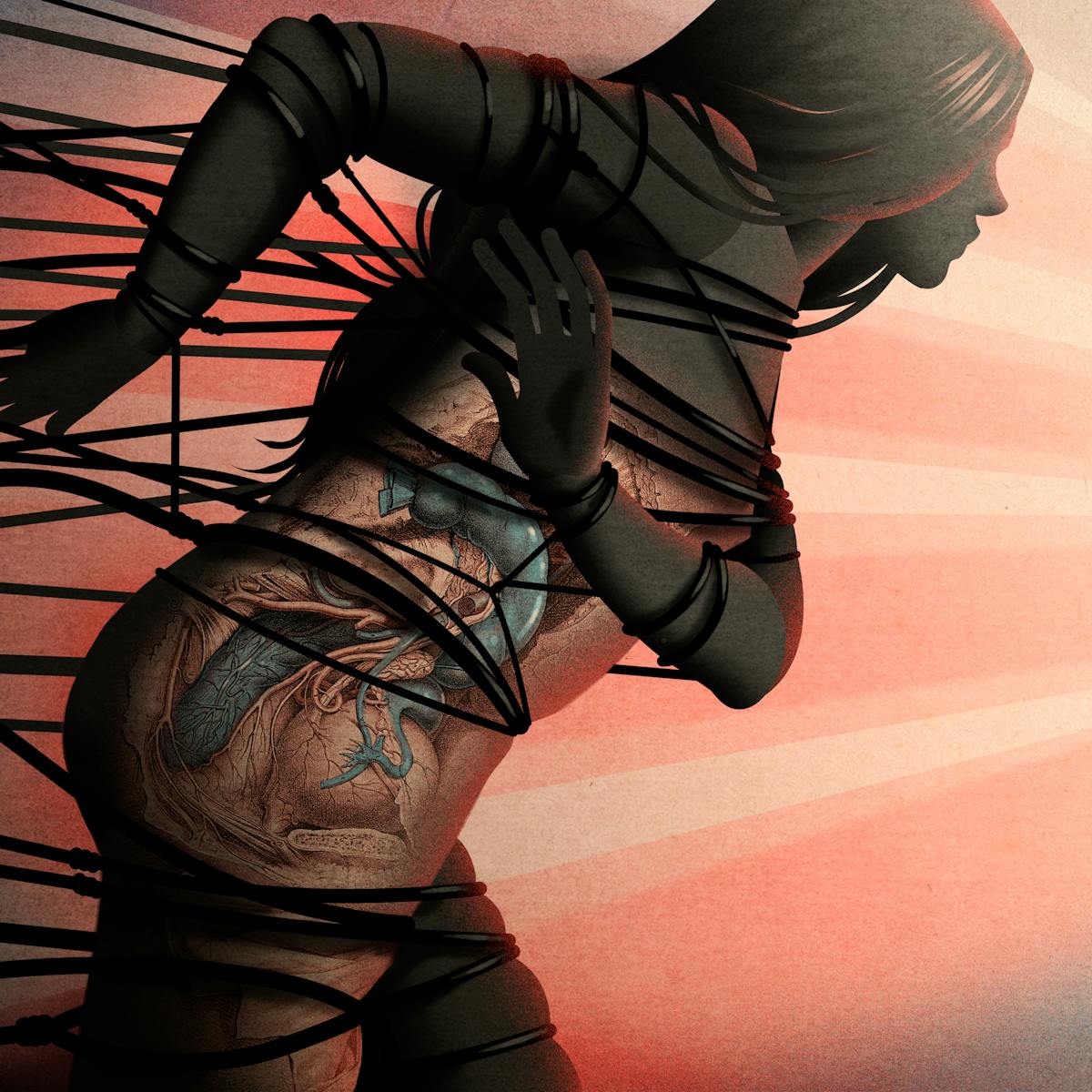A traumatic sexual assault left Lucia Osborne-Crowley overwhelmed with shame and pain. Over time she’s come to realise that trauma and shame are connected, and that both can have a profound impact on physical health. She explores the long-term consequences of being in a near-constant state of fight or flight, and whether exorcising shame can offer some relief.
How shame makes us sick
Words by Lucia Osborne-Crowleyartwork by Eduardo Rubioaverage reading time 6 minutes
- Serial

The body’s physical response to shame over time degrades us. It wears us down from the inside out.
I know this because the physiological symptoms of shame – a racing heart, a dry mouth, a thumping chest, overactive sweat glands, tunnel vision, a desperate compulsion to run away – are almost identical to the symptoms of untreated post-traumatic stress disorder, which I lived with for ten years after I was raped.
The two sensations not only consume our bodies in the same way, they also feed off each other. What triggers our shame is very often related to traumas we have experienced. I’m not just talking about extreme acts of violence like the one that punctuated my own life: I mean traumas on all ends of the spectrum. Emotional, violent, physical, psychological.
I mean heartbreak. I mean the time you slammed the brakes of your car because you thought you were about to hit something. I mean neglect. I mean abandonment. I mean the time you slept with someone even though you’d changed your mind, because you had a slight suspicion they might be moved to anger if you didn’t.
Trauma leads to shame. Trauma determines the content of shame. Shame pushes the body into a traumatic response. The more I learn about the two, the more I am convinced of their deep connection to one another.
The damage done by fight or flight
Here’s what I’ve learned about trauma, and which I now know could also be true of shame. If we become trapped in a life in which our bodies regularly enter fight-or-flight mode – the parasympathetic nervous system raging, the non-essential muscles freezing, the blood being pumped to the legs and arms – it can do long-term damage to some of our most vital biological systems.
This is because when our bodies enter this state of shame or post-traumatic stress – or both – it suspends all functions it doesn’t consider necessary for escape. All our major organs, apart from the muscles needed to carry us away, simply shut down until the panic has passed. Our kidneys, our liver, our digestive system, they all stand still. Frozen. Fragmented.
This is incredibly helpful in moments of mortal danger. But when it is triggered by shame or by pieces of a traumatic memory on a daily or near-daily basis, it starts to have devastating effects on the way the body functions.
All this stopping and starting slows down the organs and the nervous system, and impedes our biological ability to respond to our needs appropriately. Instead of running smoothly, these vital systems become spluttering car engines, revving up and shutting down, only to try and get into gear again. It’s exhausting.
Untreated trauma and physical pain
When I was 17, about 18 months after the assault, I went on holiday with friends after finishing A levels. All of a sudden I got a sharp pain in my stomach that was somehow deep but stabbing at the same time. It was like knives through muscle, I remember thinking. I keeled over.
I ignored the pain for as long as I could, but within a few days I was in A&E at my local hospital, howling, begging for relief.
This was the first of many, many times this would happen. I was in and out of hospital for all of 2010, not able to cope with the debilitating pain in my abdomen or to find any answers as to what could be causing it. The doctors did blood tests and pregnancy tests and urine tests and they kept telling me I was fine. But I wasn’t.
If we leave our fear untreated, the damage it does to our bodies can be permanent.
Over the next few years I got sicker and sicker. The abdominal pain worsened and began to be accompanied by muscle aches, joint pain, fatigue and blurred vision.
Eventually I was diagnosed with extensive endometriosis – a disease where cells from the uterus grow and spread in other parts of the abdomen where they do not belong, and cause bleeding and pain.
Endometriosis is under-researched and woefully misunderstood. It causes women debilitating pain and affects around one in ten individuals with female reproductive organs. That’s the same as diabetes, but it gets only a fraction of the funding. On average, it takes seven to ten years to diagnose.
Because endometriosis is essentially a malfunctioning of the autoimmune system – cells spreading to inappropriate places and growing, then being attacked by an overactive immune system and causing more pain, more bleeding, more abnormal cell growth – it is now one of the conditions that doctors believe can be caused by untreated trauma.
The body keeps the score
In 2015, as the pain was worsening again, I was diagnosed with Crohn’s disease. Crohn’s is another autoimmune condition, primarily affecting the bowel. Experts think that it, too, can be caused by the long-term damage done to the digestive system by living in a near-constant state of post-traumatic stress. Doctors also believe that untreated trauma can lead to multiple sclerosis, fibromyalgia and some cancers.
If a traumatised person is treated immediately, for example after a car accident, the body can learn to re-regulate itself and not flare up into post-traumatic stress symptoms each time we are reminded of the incident. But if we leave our fear untreated, the damage it does to our bodies can be permanent.
If I had asked for help when I was raped, if I hadn’t said nothing for ten years, I might not now be living with two dynamic disabilities. The thing that made me sick, after all, wasn’t the attack alone. It was the thing that was doled out alongside it: shame.
I thought I could keep running from my attacker forever. From the memory, from the nightmares of him. I was wrong. As the trauma psychiatrist Bessel van der Kolk says, “the body keeps the score”.
Now I know there is a way out. If I can process my shame, if I can speak about it and exorcise it, I will eventually recover parts of the girl I used to be. That knowledge is unbelievably empowering.
About the contributors
Lucia Osborne-Crowley
Lucia Osborne-Crowley is a writer and journalist. Her first book, ‘I Choose Elena’, was published in 2019. Her second book, ‘My Body Keeps Your Secrets’, will be published in 2020. Her news reporting and literary work has appeared in Granta, GQ, the Sunday Times, HuffPost UK, the Guardian, ABC News, Meanjin, The Lifted Brow and others.
Eduardo Rubio
Eduardo Rubio is a Mexican-born artist and illustrator living in Madrid. His work mainly involves collaboration with publishing houses and brands; he also works on personal projects, which he exhibits in galleries and museums.

